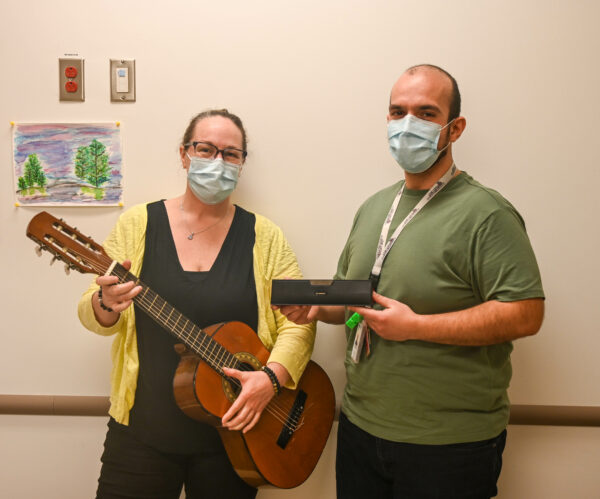Music Therapy Awareness Month
28
Mar
2022
March is recognized as Music Therapy Awareness Month in Canada, where we celebrate the services provided by Certified Music Therapists (MTA) who utilize music-based clinical practices to help engage and rehabilitate patients depending on their needs. Although Humber River Health does not have MTAs, the hospital’s Recreational Therapists, Amanda Pipino and Stephen Corradino, explain how they often incorporate music into their patient care programs.

What is music therapy?
Music therapy is the use of clinical and evidence-based interventions that use music to assist patients of all ages with a variety of different conditions. Music therapy involves using musical arts in numerous ways, including listening to music, playing instruments, song writing, lyric writing and discussions, music and movement, music and imagery, music and meditation, improvisation, beats and rhythm, and more. In some ways, it overlaps with recreational therapy. For example, as part of our program, we offer a music appreciation group that encourages patients to reminisce and foster positive memories. Patients choose a song and share why they chose it. While this still triggers emotion, recreational therapists utilize a much more basic understanding of music than a MTA would.
What are the benefits of your music appreciation group?
Music has a huge effect on the way a person feels and it can be a very beneficial coping mechanism. It can be meditative, calming, energizing, and can improve the patients’ moods. The patients are also able to learn from each other’s musical styles, which helps to foster bonds and create social connections. We also offer an educational element in the group that gives patients (and us) a new appreciation for music, by sharing interesting facts about the songs and artists they enjoy.
In addition, we have a leisure education session about the value of music where we discuss how music can change your mood and how it can be a beneficial coping tool. For instance, if you are feeling sad, you may need to listen to sad music and let it out. If you are feeling very low and tired, you may want to listen to fast, upbeat music to energize you. However, what may work for one person may not work for another. Therefore, it becomes important to understand the effect different music can have on your emotions, mood, and overall well-being.
What types of music are explored in the group?
There are only two rules in our music appreciation group- no explicit or offensive lyrics and no religious music, as to ensure we are catering to all individuals. We see a lot of variation and amazing diversity in the songs the patients choose. We also try to incorporate different themes. For example, we have done an eighties theme in the past, as well as a Super Bowl group where the patients chose songs from the artists that performed during the halftime show.
Do you have any uplifting stories to share?
One Christmas, we had given a patient the guitar to play. The patient then began playing for all of the other patients during our holiday party and everyone was singing Christmas carols together. It was amazing!
What should you be cautious of when using music as a therapeutic source?
Just as some songs can elicit positive memories, some can elicit memories associated with negative emotions as well. This may have an adverse impact on individuals with certain conditions, such as PTSD. If a patient is in a very uncomfortable and difficult mindset, they may pick songs that demonstrate how they are feeling. They can become very focused on this, rather than allowing music to assist them in a positive way. Our job as recreational therapists is to help validate how someone is feeling, and offer a way that they can choose to help themselves, if they want to. In this case, that way is music, and we can discuss, with our patients, songs to choose that can help them focus on their strengths and positive memories. We can really see a difference in the patients’ moods and feelings based on the songs they pick from week to week.
Do you have any advice on using music as a coping mechanism?
Have an open mind when it comes to music. Explore many genres and develop a greater understanding of the types of music that are out there. This will allow you to manage your feelings in a more controlled and beneficial way.
